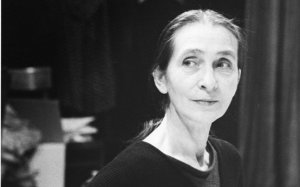It was a long time back that I watched Wim Wenders’ film PIna on the late German choreographer Pina Bausch (1940-2009) who created new vocabulary of dance through her creations at Wuppertal TanzTheater. Inspite of it being so long back, and I have seen several performances before that and ever since, the images of Pina’s choreographic creations refuse to fade away from my memory and mind. The human stories that she evokes and that are performed so beautifully by her dancers, leave lasting impressions on one’s mind, making one slowly realize that any movement, even one performed with apparent ease, can possess a quality of enormity and terrific meaning.
Here is an excerpt of one of Pina’s creations Le Sacre du Printemps which was first performed in 1975, to t Igor Stravinsky’s orchestral composition.
Before you watch it though, it would be great if you read this small review written in 1997 by Nadine Meisner (for The Times, London), that so beautifully ekes out the physicality of the performance, almost bringing the dancers to life through her words. Writing about dance is indeed an art.
The women stand hunched and shuddery, near naked in flimsy beige shifts which they draw up with childish, ungainly immodesty. They are gripped by terror because they know one of them will be the sacrificial victim to mark the end of winter – the Chosen One who dances to the death. The red dress she will wear is passed among them, a rag both fearful and fascinating. They huddle together for comfort, then disintegrate into panic-stricken scurries as destiny stirs under the surface. And when a woman is chosen (Aurelie Dupont) by the male leader, the music briefly unleashes the colossal power of its drums, like the cracking of the Russian ice in spring. It signals the release of pent-up sexual longing, the men and women flying like shards into each other’s arms.
What makes Bausch’s Rite so extraordinary is the balance between visceral realism and intervals of vivid, orchestrated geometry: the phalanxes of unison dance, the circle of dancers revolving with stately vastness to the music slow’s section, like the cycle of the seasons, like life. And then there are Bausch’s emotional images: the crowd waiting before the victim like spectators at a bullfight; the girl’s frozen terror as she is forced to walk by the man, who pushes her, half holding her up, her feet resisting hopelessly against the loose soil.
Nadine Meisner
The Times (London)
18 June 1997

